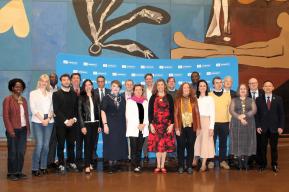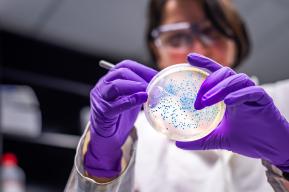News
Joint UN Training Sessions on Science Technology and Innovation Policies for Policy-makers in the SADC Countries

From 6 to 10 December 2021, a series of five training workshops on science, technology and innovation (STI) policy and policy instruments for the Southern African Development Community (SADC) region were held online by the Workstream on Capacity Building in STI for SDGs of the UN Interagency Task Team (UN-IATT), co-led by UNESCO and UNCTAD, and in cooperation with SADC.
The training attracted over 70 STI officials from 15 African countries, including Angola, Botswana, Congo, Democratic Republic of the Congo, Eswatini, Kenya, Lesotho, Madagascar, Mauritius, Mozambique, Rwanda, Senegal, South Africa, Tanzania and Zambia, as well as participants from the UN system, regional agencies, and universities, among others. Trainers include UN-IATT representatives from UNESCO, UNCTAD, UNIDO, UNU-MERIT, UNEP, UNECLAC, UNECA and EU-JRC.
The participants had the opportunities to discuss concrete examples of STI policy design and implementation, and to participate in open discussion, interactive quizzes and case studies, raising their knowledge on concepts and practices in STI policies and instruments, innovation and entrepreneurship, monitoring and evaluation processes, and how they relate to the SDGs.

The five sessions delivered by the UN-IATT team represented the 7th Module of the “STI Training Framework for STI Officials in the SADC”, convened by SADC, UNESCO Regional office in Harare, UNESCO Chair Tshwane University of Technology, UN-IATT, and University of Sussex.
STI polices are at the heart of the achievements of SDGs and addressing the pressing environmental, health, economic and social challenges. There is much scope for the STI policy communities to work together to increase investments in STI for SDGs and support regions and countries to build capacities to create robust STI systems. The five training sessions are an example of mobilising UN-wide and multistakeholders’ resources and integrating regional perspectives in STI policy capacity building. Convinced of the need for increased synergies and cooperation, UNESCO joined its UN partners to further fulfil its mission to strengthen capacities of government officials in the area of STI policy and governance.
Additional information
- Experts validate proposed Science, Technology and Innovation (STI) Training Framework for SADC
- UNESCO- SADC Science, Technology and Innovation Online Training for High Level Officials continues
- Successful science, technology and innovation policy training spurs calls for more interactive webinars
For more information, please contact:
Kornelia Tzinova, k.tzinova@unesco.org








